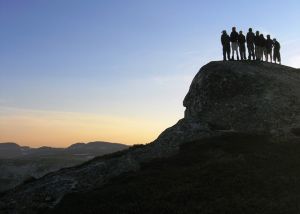How To vs What If
Boost your mid-year performance: a sure-fire way to get great results
 Do you see flexible work arrangements as an inconvenience?
Do you see flexible work arrangements as an inconvenience?
You're not alone. And yet businesses in Australia and abroad are turning to telework because of its capacity to increase staff commitment and productivity and deliver fantastic business outcomes.
Australia's most successful flexible working companies are big businesses.
However many small businesses are using remote working technologies to build a happier team.
Your best team culture – ASAP! 10 expert tips for building an engaged team
 When you're building a great team culture there is no time to waste. Every negative team moment becomes a corporate memory that you need to counteract, while every mountaintop experience builds solidarity.
When you're building a great team culture there is no time to waste. Every negative team moment becomes a corporate memory that you need to counteract, while every mountaintop experience builds solidarity.
So how can you have more of those mountaintop experiences? Form a strong team dynamic, rather than an eroded team culture?
If you want one quick tip, it is to build trust – in an ongoing, continual kind of way.
Not Every Great Team is a High Performing Team
 It seems that there is a view out there that high performing teams can be created in a matter of minutes.
It seems that there is a view out there that high performing teams can be created in a matter of minutes.
Kristi Hedges of Forbes wrote a 'how-to' piece on building a high-performing team in just 30 minutes.
However managers tend to know that a group of people does not magically transform into a high performing team without a more significant investment of time on their part.
Perhaps it is possible to build a great team in a short space of time —even one that lacks a lot of the 'normal dysfunction' that many of us have come to expect in the workplace— but what does it take to build a team that is truly high performing on an ongoing basis?
Action vs. Inaction: Which holds greater risk for your business?
 Sometimes it is what you don't do that gets you in trouble.
Sometimes it is what you don't do that gets you in trouble.
In today's volatile global economy, failing to act can be more risky than doing the wrong thing. Businesses that don't prepare for the effects of technological change are at the greatest risk, particularly in industries at imminent risk of digital disruption.
A quick definition of relevant terms is in order. Machines are replacing all levels of employees across large portions of the global corporate landscape.
This type of shift is understood as a disruption, which, according to Harvard's disruption guru, Clayton Christensen, can be defined as that which displaces "an existing market, industry, or technology and produces something new and more efficient and worthwhile."
Critical success factors for remote and mobile work

Co-working, activity-based working, distributed workforce... These emerging terms remind us that the world of work is changing fast.
But how prepared are our organisations to make mobile work succeed?
Could telework or remote work be successful in your workplace?
Sourcing good advice about how to approach telework and mobile work as an organisation has, until recently, been quite difficult. The focus of freely available information tends to be on individual flexible work arrangements, rather than on providing strategic advice for organisations.
How To Make Creativity a Habit
 In today's competitive environment businesses have come to rely on creative thinking to stay ahead of their competitors.
In today's competitive environment businesses have come to rely on creative thinking to stay ahead of their competitors.
This means that creative thinking is a highly valued skill in most organisations and today's creative problem solver frequently becomes tomorrow's executive.
The only problem with creativity is that it's rather mysterious and hard to explain.
Ask any artist, poet, scientist or inventor how they come up with great ideas and they'll find it really hard to describe their creative process.
Five kinds of clients advisors should be wary of
 Whether you're a lawyer, accountant, naturopath or financial planner, there are five types of clients to be wary of.
Whether you're a lawyer, accountant, naturopath or financial planner, there are five types of clients to be wary of.
Anna Pino, who trained as a psychologist and is CEO of Lighthouse Business Innovation Centre, a virtual accelerator working with entrepreneurs, inventors and researchers says that for advisor type businesses not all clients are created equal.
"Some people are just not ready or suited to advisor-client relationships," said Ms Pino.
Knowing when to pivot and when to persevere
 Few startups reach maturity without having to pivot or change direction at some point during their journey. In fact, most of them will have to change a couple of times to adapt to changing market conditions or new opportunities.
Few startups reach maturity without having to pivot or change direction at some point during their journey. In fact, most of them will have to change a couple of times to adapt to changing market conditions or new opportunities.
There are some useful tools available on the market to help you identify the strengths and weaknesses of your business idea. One such tool is BizLab; an online business diagnostic tool that looks at market viability, risk and your business model.
Tools like BizLab provide an early warning of problems with your business idea and can provide a good indication that a pivot is required.
The gap between 'should' and 'done'
 When you're a start-up you're often everything in the business – technician, salesperson, accounts department and office manager.
When you're a start-up you're often everything in the business – technician, salesperson, accounts department and office manager.
Not all of these roles come naturally and there are very often specific functions that you like less than others. This normally translates into a gap between tasks you know you 'should' do, but for a range of reasons don't always land up on the 'done' list.
Anna Pino, CEO of Lighthouse Business Innovation Centre, a virtual accelerator working with entrepreneurs, inventors and researchers says that business diagnostic tools like BizLab, highlight these strengths and weaknesses in a graphic form and provide a bit of a wake-up call for areas that need attention.

